| Srl | Item |
| 1 |
ID:
073661
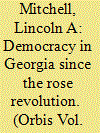

|
|
|
|
|
| Publication |
2006.
|
| Summary/Abstract |
Success for Georgia's nascent democracy would be a major success for the democracy-promotion efforts of the United States, which has hailed the democratization there since the Rose Revolution as a success even as concerns have been voiced by some observers regarding the pace and direction of this effort. The U.S. policy of unconditional support for Georgia's government and its disinterest in drawing attention to the new government's democratization shortcomings call into question how serious the United States is about democracy-promotion, particularly in countries that have a semi-democratic but pro-American government. A U.S. approach to Georgia that recognizes the challenges there and seeks to help it solve these problems will demonstrate that America is sincere in its desire to promote democracy, not just to support friendly governments.
|
|
|
|
|
|
|
|
|
|
|
|
|
|
|
|
| 2 |
ID:
084655
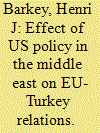

|
|
|
| 3 |
ID:
073074
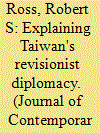

|
|
|
| 4 |
ID:
144442


|
|
|
|
|
| Summary/Abstract |
The rise of China in the 21st century has generated a new round of debates on American policy toward Taiwan. Generally speaking, one side suggests that Washington should adjust its Taiwan policy to improve its relations with China, while the other argues against downgrading the relations with Taiwan. Both sides invoke the concept of national interest, but the concept is not unproblematic, and cherry-picking different facts and arguments is far from convincing. This article has two purposes: using the concept of national interest to examine the Taiwan policy, and using this case to illuminate the concept itself. After reviewing the concept, I propose what I call ‘four Ps’ framework to facilitate policy-making and analysis. The framework comprises four factors that help determine which policy is in national interest. They are players (decision makers), preferences (foreign policy goals), prospects (possible outcomes), and power (the capability of achieving goals).
|
|
|
|
|
|
|
|
|
|
|
|
|
|
|
|
| 5 |
ID:
181249


|
|
|
| 6 |
ID:
140474
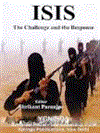

|
|
|
|
|
| Publication |
DelhI, Kalinga Publications, 2015.
|
| Description |
xx, 114p.: mapshbk
|
| Standard Number |
9788187644996
|
|
|
|
|
|
|
|
|
|
|
|
Copies: C:1/I:0,R:0,Q:0
Circulation
| Accession# | Call# | Current Location | Status | Policy | Location |
| 058275 | 303.625/PAR 058275 | Main | On Shelf | General | |
|
|
|
|
| 7 |
ID:
049828


|
|
|
|
|
| Publication |
Jan-Feb 2004.
|
| Summary/Abstract |
The Bush administration has literalized its "war" on terrorism, dissolving the legal boundaries between what a government can do in peacetime and what's allowed in war. This move may have made it easier for Washington to detain or kill suspects, but it has also threatened basic due process rights, thereby endangering us all.
|
|
|
|
|
|
|
|
|
|
|
|
|
|
|
|
| 8 |
ID:
068810


|
|
|
| 9 |
ID:
140530
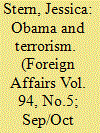

|
|
|
|
|
| Summary/Abstract |
U.S. President Barack Obama came into office determined to end a seemingly endless war on terrorism. Obama pledged to make his counterterrorism policies more nimble, more transparent, and more ethical than the ones pursued by the George W. Bush administration. Obama wanted to get away from the overreliance on force that characterized the Bush era, which led to the disastrous U.S. invasion of Iraq in 2003. That war, in turn, compromised the U.S. campaign against al Qaeda. During the past six-plus years, Obama has overseen an approach that relies on a combination of targeted killing, security assistance to military and intelligence forces in partner and allied countries, and intensive electronic surveillance. He has also initiated, although in a tentative way, a crucial effort to identify and address the underlying causes of terrorism. Overall, these steps amount to an improvement over the Bush years.
|
|
|
|
|
|
|
|
|
|
|
|
|
|
|
|
| 10 |
ID:
093622
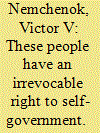

|
|
|
|
|
| Publication |
2009.
|
| Summary/Abstract |
Upon entering office, Carter Administration officials placed a heavy emphasis on integrating human rights into United States foreign policy. They also sought to contain festering Arab-Israeli tensions in the Middle East. The intersection of these two issues was the Israeli-Palestinian conflict. This article examines the Administration's attempts to solve that conflict and to bring peace to the region. It argues that policymakers developed a sincere dedication to safeguarding Palestinian rights, but that their understanding of those rights was limited in scope and defined through the lens of United States security and strategic interests. In spite of a good-faith effort to satisfy Palestinian desires while maintaining a constructive relationship with Israel, the Administration ultimately failed to alter the status quo because of regional developments. As Washington's strategic thinking changed, so did the urgency of Palestinian rights.
|
|
|
|
|
|
|
|
|
|
|
|
|
|
|
|
| 11 |
ID:
085459
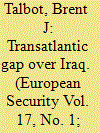

|
|
|
|
|
| Publication |
2008.
|
| Summary/Abstract |
This paper makes three major arguments: 1) US policy inconsistencies during the Iraq containment era alienated key European allies; 2) the allies really wanted the same outcome as the US in Iraq; and 3) the allies supported the US role as leader of the international system, but they envisioned a cooperative leader, not the unilateral actions of the Clinton and Bush (Jr) administrations. Thus, US policy inconsistencies are partially responsible for the lack of allied support for the 2003 invasion of Iraq. Three time periods are examined: the Gulf War (1990-91), the Clinton-led coalition that continued against Iraq under UN sanctions-prior to the invasion to oust Saddam Hussein (1991-2002), and events during the Bush administration which led to the 2003 takeover of Iraq. The paper concludes with lessons learned and implications for future of US-European relations.
|
|
|
|
|
|
|
|
|
|
|
|
|
|
|
|
| 12 |
ID:
087049


|
|
|
|
|
| Publication |
Washington, U.S. Government Office, 1977.
|
| Description |
19p.
|
|
|
|
|
|
|
|
|
|
|
|
Copies: C:1/I:0,R:0,Q:0
Circulation
| Accession# | Call# | Current Location | Status | Policy | Location |
| 020069 | 328.327 7306/COM 020069 | Main | On Shelf | General | |
|
|
|
|
| 13 |
ID:
140500


|
|
|
|
|
| Summary/Abstract |
Rose devotes much of his article to rehearsing a litany of the Bush administration’s sins in an effort to persuade readers that Obama inherited a uniquely bad set of cards when he came to the White House—a “mess,” as the president liked to say—and must therefore be judged accordingly. But this is doubtful as a matter of history and past its sell-by date as a form of apology.
|
|
|
|
|
|
|
|
|
|
|
|
|
|
|
|